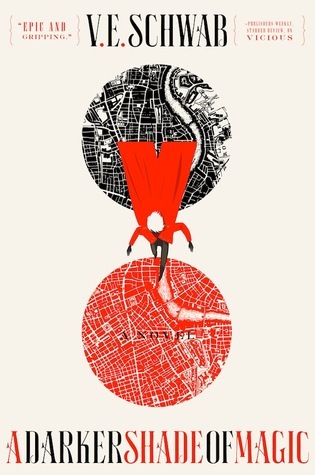
A Darker Shade of Magic
Chapter 4: Red royal I
by Schwab, V. E.The chapter opens with guards Gen and Parrish playing cards outside Prince Rhy’s chambers. Parrish loses repeatedly, grumbling about his losses before leaving to relieve himself. The scene establishes their camaraderie and the relaxed atmosphere of their duty, underscored by Prince Rhy’s leniency and fondness for his guards. The ornate setting, including the cherrywood doors adorned with the royal emblem, hints at the opulence of the palace and Rhy’s privileged yet approachable nature.
Upon returning, Parrish finds Gen absent and hears a conversation inside Rhy’s chambers. The voice belongs to Holland, an Antari from another world, whose eerie presence unsettles Parrish. Holland’s unnerving demeanor—cold, shadow-like, and almost inhuman—contrasts sharply with Rhy’s warmth. Parrish, torn between duty and curiosity, overhears their exchange, which begins with polite formality but carries an undercurrent of tension and flirtation.
Holland reveals he’s delivering a birthday gift from his rulers, carefully chosen within the city to avoid breaking laws against interworld exchanges. Rhy hesitates but accepts, questioning the gift’s purpose. Holland cryptically replies, “For strength,” leaving the prince—and Parrish—intrigued. The moment is interrupted by palace clocks, masking further dialogue as Holland exits, his parting words and a coin left with Parrish implying a magical influence over the guard’s memory.
The chapter closes with Parrish alone, clutching the coin and grappling with a fading recollection of the encounter. The scene underscores Holland’s enigmatic power and the subtle threats lurking beneath courtly interactions. The blend of casual guard banter, royal opulence, and supernatural intrigue sets the stage for deeper political and magical tensions, leaving the reader questioning Holland’s true motives and the significance of his gift.
FAQs
1. How does the relationship between Prince Rhy and his guards differ from traditional royal-guard dynamics?
Answer:
Prince Rhy shares an unusually informal and lenient relationship with his guards, particularly Parrish and Gen. Unlike traditional royal-guard dynamics, which emphasize strict formality and hierarchy, Rhy treats his guards with camaraderie—gifting Parrish a deck of cards, conversing in the common tongue (Arnesian) after drinking, and even expressing guilt over their monotonous duties. The guards are tasked more with discretion than rigorous protection, especially since Kell, Rhy’s Antari brother, is considered a far more capable protector. This relaxed dynamic reflects Rhy’s good-natured personality and his discomfort with royal pretensions.2. Analyze how Holland’s characterization creates tension in the scene. What specific details contribute to his unsettling presence?
Answer:
Holland’s unsettling aura is built through vivid physical and behavioral descriptions: his “shadow in the woods” voice, “haunted eyes” (one black, one milky green), and comparisons to “water and stone” rather than flesh. His reputation as “Hollow” among guards and Parrish’s visceral fear—rooted in Holland’s unnatural stillness and implied power—heighten tension. The scene’s suspense peaks when Holland manipulates Parrish’s memory with a coin, leaving him disoriented. These elements frame Holland as enigmatic, dangerous, and otherworldly, contrasting sharply with Rhy’s warmth and the guards’ mundanity.3. What thematic role does the motif of gambling play in this chapter?
Answer:
Gambling serves as a metaphor for risk and deception, mirroring larger tensions in the narrative. Parrish and Gen’s card game involves literal cheating, paralleling Holland’s covert visit to Rhy—a political gamble where motives are obscured. Parrish’s financial loss (“I’m broke”) hints at higher stakes: guards gamble with duty (abandoning posts), while Holland gambles with secrecy (bribing Parrish). The gilded cards, a gift from Rhy, also symbolize the blurred lines between generosity and manipulation, foreshadowing Holland’s “gift” to the prince, which carries ambiguous intentions.4. How does the chapter use language and translation to highlight cultural or social divides?
Answer:
Language barriers underscore power dynamics and identity. Royal (English) is associated with formality and pretension, while Arnesian (the “common tongue”) signals intimacy, as when Rhy switches to it while drinking with guards. Holland’s accented English marks him as an outsider, amplifying Parrish’s distrust. The guards’ use of Arnesian for casual conversation contrasts with Holland’s deliberate, measured speech, reinforcing his alienation. These linguistic choices emphasize themes of belonging, authority, and the friction between worlds—literal (Holland’s cross-world travel) and social (royals vs. guards).5. Evaluate the significance of the “gift” Holland delivers to Rhy. What might its purpose imply for future events?
Answer:
Holland’s gift, ostensibly for Rhy’s birthday, is shrouded in ambiguity. His claim that it’s “for strength” and locally procured (to bypass laws) suggests it may be magical or politically charged. The secrecy—Holland’s memory manipulation and insistence “I wasn’t here”—hints at ulterior motives, possibly tied to his rulers’ schemes. Rhy’s hesitation implies the gift violates norms, foreshadowing conflict. The exchange mirrors Kell’s absence, raising questions about whether the gift is a weapon, a test, or a trap, setting up future tension between kingdoms or within Rhy’s court.
Quotes
1. “If anything, Rhy seemed to feel guilty for the persistent presence of the guards, as if surely they had something better to do with their time than stand outside his door and be vigilant (and in truth, most nights it was more a matter of discretion than vigilance).”
This quote reveals Prince Rhy’s character—his humility and awareness of privilege—while also hinting at the relaxed nature of his royal guard’s duties, which sets up the later tension when Holland arrives.
2. “It was a voice like a shadow in the woods at night. Quiet and dark and cold. And it belonged to Holland. The Antari from afar.”
This vivid description introduces Holland’s ominous presence and establishes the unease he inspires, contrasting sharply with the earlier casual atmosphere of the guards’ card game.
3. “‘I wasn’t here,’ said Holland as the coin rose and fell. And by the time it hit Parrish’s palm, he was alone in the hall, staring down at the disk, wondering how it got there, and certain he was forgetting something.”
This moment captures Holland’s mysterious power and the unsettling effect he has on others, while also introducing a magical element (memory manipulation) that hints at larger plot developments.
